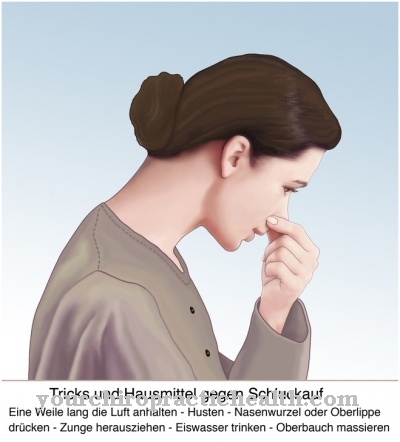Sensory disturbances are expressed in the changed perception of physical sensations, such as numbness or indefinable pain. The causes for this can be numerous and must be diagnosed very precisely in order for a cure to occur.
What are sensitivity disorders?

Nerve endings, receptors and sensors perceive stimuli throughout the body and transmit information about them to the brain, where they are processed into sensations and impressions. Stimuli differ in mechanical stimuli, such as pressure or vibration, sensations of temperature and pain, and sensations of movement.
If there is a sensitivity disorder, these stimuli are perceived as unpleasant, intensified or absent. Typical of such a disorder are tingling, burning, itching, a feeling of numbness, indefinable pain or an exaggerated perception of cold and warmth, also known as hyperalgesia.
It can happen that patients with sensory disturbances injure themselves without realizing it, consequently not treating the wound and becoming infected with severe infections. Prolonged sensitivity disorders must be treated by a doctor in any case.
causes
The causes of a sensitivity disorder can range from temporary irritation of the nerves to serious diseases of the nervous system.
In particular, the following causes can exist:
- stroke
- Tumors, especially in the brain and spinal cord
- Medication
- Allergies
- Viruses
- Infections caused by bacteria
- anemia
- Vitamin, magnesium and iron deficiency
- Hyperventilation
- Anxiety and panic attacks
- Damage to nerves from infection, toxins, or mechanical stimuli
- Burns
- Nerve irritation from examinations such as CSF puncture
- Damage to the musculoskeletal system (e.g. herniated disc)
- Diabetes and alcoholism
- Neurological diseases like Parkinson's or MS
- Blood circulation disorders
- migraine
You can find your medication here
➔ Medicines for paresthesia and circulatory disordersDiseases with this symptom
- stroke
- Subclavian steal syndrome
- multiple sclerosis
- Polyneuropathy
- allergy
- Funicular myelosis
- Restless legs syndrome
- Subarachnoid hemorrhage
- Circulatory disorders
- Vitamin B12 deficiency
- Zika virus infection
- Guillain-Barré Syndrome
Diagnosis & course
A doctor's examination is essential in the case of sensitivity disorders due to the numerous possible causes. It must be determined whether a harmless nerve irritation or a serious illness is present. Such tests are done by a neurologist.
Sometimes limb numbness is not taken seriously, although it can be caused by illnesses such as a stroke. The diagnosis is first made by interviewing the patient. The doctor must clarify since when the patient has been suffering from the present complaints, which triggering events could be the basis, whether there are other complaints or previous illnesses and whether medication is taken regularly.
In addition to the questioning, a detailed physical examination, blood test and neurological examination will be carried out. By means of a sensitivity test, the doctor tests whether the sensation of pressure is damaged, whether the person concerned has a disturbed sensation of temperature and pain and whether the sensation of movement is impaired.
A specific diagnosis must be made after narrowing down the symptoms by means of computed tomography, magnetic resonance imaging, electroneurography, electroencephalography, cerebral fluid examination, x-rays, differentiated blood tests, angiographies, allergy tests and orthopedic examinations.
Complications
Various physical and psychological complications are possible depending on the sensitivity disorder. In particular, if the sensitivity is completely lost, there is a risk that injuries or other illnesses will be overlooked because the person concerned does not notice them. The risk is increased if personal hygiene is also neglected.
For this reason, it is important to regularly visually check the affected body region. Daily washing is a good opportunity. Open wounds that are not discovered in time can become infected. If the sensitivity disturbance is due to diabetes mellitus, additional wound healing disorders are possible. This creates a high risk of infection and inflammation.
As a result, in severe cases, further medical complications such as blood poisoning, abscesses or the death of body tissue are possible. In addition, sensory disorders represent a potential psychological burden. Various mental complications are possible, especially when the sensation of pain is increased. Often the sensitivity disturbances lead to a diffuse psychological suffering. However, specific illnesses like depression can also develop.
In addition, in some cases sensitivity disorders lead to restrictions in everyday life and at work. The changed perception often takes getting used to. In some cases, movements become unsafe if the usual feedback from the sensors is missing. This can also cause secondary motor problems. In particular with the increased sensitivity to pain (hyperalgesia), people close to you (for example partners) must first come to terms with it, since normal contact can also cause pain.
When should you go to the doctor?
As a rule, a doctor should always be consulted if the sensory disturbances suddenly appear for no particular reason. The affected person can wait a few days, however, as the disturbances in many cases go away on their own. However, if this persists and does not go by itself, a visit to the doctor is necessary. A visit to a doctor is also advisable in the event of increased sensitivity to pain. This can be an underlying disease that definitely needs to be investigated.
Painkillers should, if possible, not be taken over a long period of time as they damage the stomach. If the sensory disturbances occur after an inflammation or after an infection, it is also advisable to consult a doctor. In this way, consequential damage and further complications can be avoided. If reddening of the skin occurs in addition to the disturbances, a doctor can also be consulted after a few days without improvement. In some cases, the sensitivity disorders also occur after consuming alcohol and other drugs. In this case, the symptoms usually go away on their own after a short time. Withdrawal may be necessary for the patient.
Doctors & therapists in your area
Treatment & Therapy
Depending on the cause, the treatment of a sensitivity disorder can be different and either address the cause or the symptoms. Diseases of the nervous system usually require drug therapy. Pinched nerves can be removed manually or through surgery.
If there is a stroke, intensive medical measures must be taken immediately. An untreated stroke causes damage and can be fatal. If the cause is medication, medication may only be discontinued under the supervision of a doctor. Bacterial infections require antibiotics, alcoholism withdrawal and vitamin B1 at the same time. In diabetics, optimizing the blood sugar level and administering alpha lipoic acid can help.
Treating the causes of a sensitivity disorder can be assisted by alleviating the symptoms. This is useful in the area of pain relief through the administration of painkillers, anticonvulsants or antidepressants. Transcutaneous electrical nerve stimulation supplements or replaces drug-based pain therapy.
Outlook & forecast
The prognosis for sensory disorders depends on the underlying disease. If the symptoms arise due to exposure to too much cold or overloading of the body, the disorders usually disappear again without treatment. The organism must then be provided with sufficient warmth and rest. A full recovery is possible in these cases within a few hours and a restful sleep.
If the sensory disturbances are due to problems with the blood circulation, treatment must be initiated, otherwise the symptoms will increase. The sooner medical care is provided, the better the chances of recovery. Severe circulatory disorders can lead to a heart attack or a stroke. Both are in acute danger of death.
Survivors often suffer from permanent impairment. Paralysis, cardiac arrhythmias or limitations of certain functions are often still present many years after the incident.
The prognosis is good for sensory disorders caused by muscle or nerve damage. Medication can cure inflammation or infection so that the disorder disappears completely within a few weeks. A pinched nerve can be released through orthopedic techniques or surgery. The symptoms are alleviated within a short time, so that they have completely disappeared within days. Physiotherapy is often recommended so that the person concerned remains symptom-free in the long term.
You can find your medication here
➔ Medicines for paresthesia and circulatory disordersprevention
There is no general way to prevent sensory disorders. We recommend a balanced diet that provides the body with all the important vitamins and minerals, plenty of exercise, a healthy level of relaxation and reducing stress. In the case of orthopedic diseases, long-term physiotherapy can also have a preventive effect.
You can do that yourself
The treatment of a sensitivity disorder can be supplemented by measures that support recovery. However, extensive medical therapy is always necessary. If perception is restricted or the sensation of pain is reduced, the sensors are stimulated by an external stimulus. Those affected can do this themselves, starting with a light stroke with a feather over the skin in the event of a slight restriction. In the advanced stage, it is advisable to tap the affected parts of the body lightly to moderately with a wooden mallet. If the disorder is very advanced, electric shocks can also be used by appropriate devices. However, these are only examples of external stimulation.
You can also work with objects of various shapes or surfaces, or with massages. Massages are performed either by the person concerned or by someone else. With the latter, for example, you can guess which parts of the body are being touched. If other senses are affected by a disorder, there are also possibilities for stimulation. Regarding the sense of smell, ammonia or strong perfume is recommended. If the taste is restricted, lemon, horseradish, hot mustard, wormwood tea or chilli can help. The hearing is stimulated by loud music or other noises.
In general, the person affected can try to train their senses in everyday life, be it through an active perception of their surroundings or any activities that strongly irritate the skin, smell, taste and hearing.





.jpg)





















